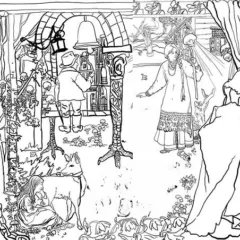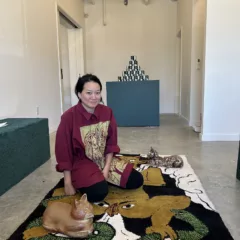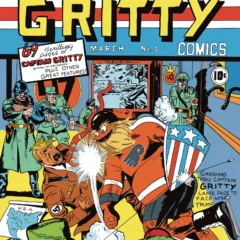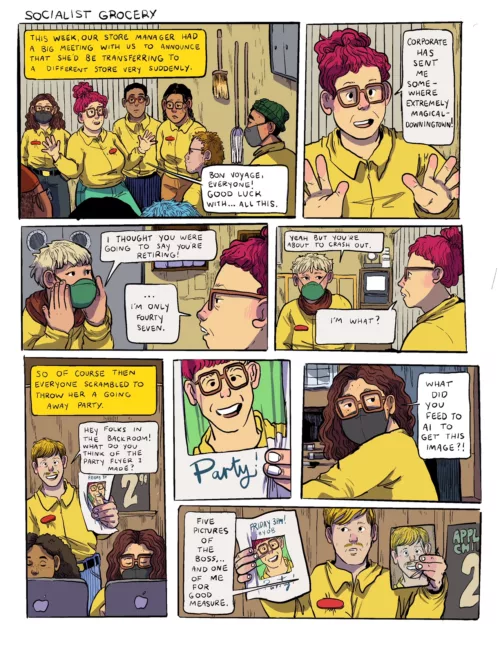
Wit speaks with Trapeta Mayson, Philadelphia’s new Poet Laureate. Tune in to learn more about how Trapeta plans to use background as a social worker and decades of experience as a teaching artist to use poetry as a tool for community outreach and healing.
You can listen to Artblog Radio on Apple Podcasts and Spotify. Thank you to Kyle McKay for composing Artblog Radio’s original podcast intro and outro!
Wit López: Hello everyone, and welcome to another episode of Artblog Radio. I’m your host for today, Wit López, and I am absolutely delighted to be sitting with Philadelphia’s newest Poet Laureate, Trapeta Mayson. Welcome to the show, Ms. Mayson.
Trapeta Mayson: Aw, thank you for having me, Wit. It is a pleasure and an honor to be here in your company. Thank you for having me.
Wit López: No, thank you. If you don’t know Trapeta Mayson’s work, it is absolutely amazing. She’s not only a brilliant and talented poet, but she’s also a social worker. And on top of that, she’s an amazing arts administrator who has a very long history doing wonderful life-changing arts administration within the city of Philadelphia. So I’m absolutely delighted that she’s been awarded this very high honor of being the Poet Laureate of the city, and I’m looking forward to all the amazing work that I know is going to come out of her time being in that position.
Trapeta Mayson: Thank you, thank you.
Wit López: Oh, no problem, thank you.
Trapeta Mayson: I’m looking forward to it too. I’m like, I’m still like floating, so this is a wonderful thing and we’re not even a full week in yet, and I’m ready to do it.
Wit López: I’m ready too. Honestly, when I, when I first heard that you got it, I was so excited. I was in my house and I was screaming, you would have thought that I won the lotto, you would have thought I was. I was very excited and I was like, I couldn’t think of a more perfect person.
Trapeta Mayson: Wow.
Wit López: Based on the work that I know that you’ve done in the city and the way that you’ve touched people’s lives, I could not think of a more perfect person to be in a position to continue to touch lives and to continue to change the city for the better. So it’s really exciting.
Trapeta Mayson: Thank you, I’m humbled. Thank you. Thank you.
Wit López: So Ms. Trapeta, you’re an amazing poet. Would you be open to sharing a poem with us?
Trapeta Mayson: Yeah, I will. Um, there’s nothing better than like a Monday afternoon or week day when you can share a poem, so I’m going to do that. This one is called, “Late 1920s” or “Happy birthday, Dinah.” And I wrote this poem for a, as a series of poems that I’m working on about a woman named Dinah who was enslaved in the Stenton Mansion, which is in Logan, and there’s no recorded birthday for Dinah and many others, you know, of our ancestors that were enslaved in households all over this place. So, um, this is for her. “Happy birthday, Dinah”:
Two of us waited by your momma’s thighs, rubbed her belly and felt her walls grip and release. One of us parted her legs wide like a road opening and stood right dead in the center of her, impaired into her dark tunnel and saw your crowning. We set ourselves in that leaning shack. We grounded ourselves to catch you. A ball of slick and slippery, brown as you were. A thumping mass of hair and birth and scars you were. Don’t let anyone tell you you don’t have no born date. We were there. We witnessed you arriving. You came out calm as a river in June. Your mother yelped and cooed. We warned our palms before we held you. Your mama would not let you go. She should have been born in another time. She didn’t know how to let go of you. We encircle her and chanted away her sorrow. We three sisters warn her: steal away, steal away, steal away home. She ain’t got long to stay here. You were born before the sun tipped his hat. It was a Saturday and we wore white. Your momma’s lips quivered when she asked if you were a boy or a girl. Her question vibrated that room, unsteadying us. A boy will be seasoned until he’s a work horse. A girl will be bred soon she start to bleed. She’s a girl, we told her, she’s a girl, and something in her broke. We call that thing love, Dinah. It’s Black love and sometime it looks like an easing river. Sometimes it’s a tight ball of blood and wounds. You have people Dinah. We waited right near your mama’s heavy thighs. We held her feet and her arms. We warmed our palms before we caught you, and later when you sprung up a wee bit and they came to snatch you from us to give you to Miss Hannah like a play toy, we held our palms to our wet cheeks and felt your warmth fleeing, and to your weeping willow of a mama, we chanted our love song. We three sisters soothed her: steal away, steal away, steal away home. She ain’t had long to stay here.
Wit López: Mm. That. Mm.
Trapeta Mayson: Dinah.
Wit López: That is beautiful.
Trapeta Mayson: Thank you.
Wit López: That is beautiful in so many ways. In so many ways. I mean, it tells a story of an actual person who was here.
Trapeta Mayson: Yes, yes. Dinah was a real person and, um, you know, when I encountered her, it’s just so one-dimensional, you know, as, uh, as a lot of our stories are, particularly from that era, you know, so we know a lot about Ona Judge thanks to, um, Professor Dunbar. And, um, she wrote a lot about, you know, Ona. But Dinah, I just heard about her as, “Oh, she was the slave at Stenton who saved the house.” And I just felt like, gosh, she must have a bigger story. I mean, even if that is one of the acts that she did, I mean, what does she feel like, you know, um, what were, what was she thinking about? Who did she love? Dinah had a husband, and one of the most intriguing stories about Dinah is that, um, she begged her, you know, her enslavers to free her husband,
Wit López: Mmm.
Trapeta Mayson: and he was freed and he came to, you know, to live, you know, at Stenton. This is one of the things that she wanted, and, um, she had a daughter. Um, so these things, I just think about, what does she think about at, at night, all those years by herself, this, this woman, you know, like, um, and so I kind of put her in conversation with Ona Judge so they can talk about things, and Dinah also demanded her own freedom, but when she was freed, she ended up staying at the house, and there’ll be a lot of people in today’s time, whereas Ona Judge ran away from the Washingtons, and a lot of people would judge that. I know I did when I first heard it, coupled with the saving the house myth, and then the staying in a house after you got your freedom. We all tend to judge these things, but we don’t know what people are going through.
Wit López: Absolutely. So when you say the “saving the house myth”, could you explain what you mean by that?
Trapeta Mayson: Yes. So, there was a period of time in the Revolutionary War when, um, and I want to tell this story loosely, but Dinah, um, there were some soldiers that came and they wanted to, you know, burn down the house, or something they were trying to do, and Dinah led them to the barn, or she told them there were some people, you know, in the barn and she, they went into the barn and then another set of soldiers came in and she told them where to find those other individuals and they were able to arrest them and get them away from the house. So that whole idea of, wow, she was going to burn down, what has become known as this very historic home. It was a home of James Logan, um, and he was a statesman. He worked at William Penn, and then just about everything in Philly, downtown is Logan Circle, Logan Community.
Wit López: Yup. Right, right.
Trapeta Mayson: You know, um, although she was, uh, enslaved under Hannah Logan. It was just interesting that, she, you know, the whole idea of her saving his house was the one narrative that people kind of ran away with.
Wit López: Right.
Trapeta Mayson: And usually it was the people who basically are telling the story, telling her story.
Wit López: Exactly.
Trapeta Mayson: And I just really felt compelled, like I, although I don’t own Dinah’s story, I felt more apt to tell it, you know, and I felt that poetry is a way, you know, to really to tell it. And then I, um, I just, I just wanted to do her justice, so I went through this thing, I don’t even know if it was real or imagined that Dinah was kind of leading me to, you know, “tell them about this”, you know. So then I started talking about, you know,
Wit López: Mm, wow.
Trapeta Mayson: Um, you know, Ona, cause I started making up this friendship cause they didn’t know each other Ona Judge and her and, one time there was a thing about, um, loneliness at night. You know, lots of times as individuals, you know, whether you’re with someone or you’re, or you’re partnered up or not, and that feeling of being lonely, and Dinah was like “telling them about that.” Like her husband, by the time he joined her, he was lame and sick. And what does she do? What does she do with her body? What is she doing with herself? That’s not something people want to think about, what our, you know, enslaved, you know, our ancestors, right?
Wit López: Right, right.
Trapeta Mayson: All we think about is they wanted their freedom or they didn’t get their freedom, but, you know, what did they do?
Wit López: They were, they were people with everyday life.
Trapeta Mayson: They were people!
Wit López: Absolutely, absolutely.
Trapeta Mayson: Yeah, so that’s what I’m trying to accomplish with this, and I just wanted, all I keep saying, I just want to do her justice. Justice.
Wit López: Absolutely.
Trapeta Mayson: Yeah, so.
Wit López: And I mean, from listening to that poem, I definitely think that you’re doing her story a lot of justice.
Trapeta Mayson: Thank you.
Wit López: And, just, you’re doing her justice and bringing her back to life through those words.
Trapeta Maysonn: Yes. Yeah.
Wit López: And allowing her to live a life that she may not, or may, may or may not have been able to live, but you’re definitely keeping her alive, and, in your work and in the memory of those who are able to listen to your work.
Trapeta Mayson: Yeah, thank you.
Wit López: So thank you.
Trapeta Mayson: And I wanted to have joy in there, like, I didn’t want, you know, we, we’re all multifaceted.
Wit López: Absolutely, absolutely.
Trapeta Mayson: You know, tell the joy and the sorrow, so.
Wit López: Absolutely.
Trapeta Mayson: Thank you. That felt good to read that. I have, I’ve only read it like three times. I read it in front of the American Historian Group, it’s the American Association of Historians or something, and um, I was thrilled that they were like, “Oh, this is good. It’s a good way to tell history.”
Wit López: Absolutely, yes.
Trapeta Mayson: It was validating. Yeah.
Wit López: Absolutely, absolutely. For those of you who are listening, uh, James Logan lived in Stenton Mansion, which is located in the Logan section of Philadelphia, in North Philadelphia, and he was a statesman, as Ms. Trapeta said, he was also the 14th mayor of the city of Philadelphia, and Dinah, who is featured in her poem, was enslaved by his sister, Hannah.
Trapeta Mayson: Yeah. Hannah. That’s right. His sister, daughter-in-law, one of them, I believe.
Wit López: Oh, okay.
Trapeta Mayson: But you would know, but yeah, cause I think it was a daughter-in-law, but well.
Wit López: Thank you.
Trapeta Mayson: You guys can look up some history.
Wit López: Exactly, exactly. Look up your Philadelphia history, folks, if you’re listening.
Trapeta Mayson: Yes
Wit López: Thank you for sharing. That’s really beautiful. Thank you. So once again, congratulations on being Poet Laureate.
Trapeta Mayson: Thank you.
Wit López: You obviously deserve it with work like that. It’s really wonderful work. So where do you see your, uh, your practice going with this position as Poet Laureate of the city?
Trapeta Mayson: Um, you know, so I was explaining to somebody the other day, I think I have more ideas than I can contain or the city can hold and being a full time, you know, employed person and a full time artist, and I’m proud to hold both those titles, um, I think, you know, there’s so much I want to do, and I think it’s going to focus really on partnerships. So I, I’m putting them all in these little categories, right? So libraries are very dear to my heart. I’m a member of a Friends group of the Germantown regional library, um
Wit López: Wonderful!
Trapeta Mayson: Joseph E. Coleman, it’s just a small group of us doing bake sales and stuff, but I love it. So I want to be, and I have, um, a poetry mural in the Logan Library up home called “Read.”
Wit López: That’s wonderful.
Trapeta Mayson: And I worked with an artist called Ife Nii Owoo. So I wanna do, um, I want to do some really serious work with libraries. Um, I’m crafting it now and it’s more of a visual piece, um, that you’ll see that’ll get community members involved in local branches. But that’s one thing. Another piece I want to really tackle is mental illness. Mental health has been a big part of-
Wit López: That’s so important.
Wit López: It’s essential. So I want to partner with community social service agencies, mental health agencies, and I want to do things like how we have a moment of silence, maybe, I want to look at, you know, projects like a moment of poetry where, you know, doing, um, mental health month or thinking about how often people commit suicide and using those as pause points to do a healing verse,
Wit López: Wow.
Trapeta Mayson: you know, so I’m crafting that. I’m trying to get that together. And I’m going to leverage and use my partnerships with other writers and creators across the city. And then, um, I really want to do something in Reading Terminal, like something really cool and interesting like cooking and food and food lexicons and having this big blowout poetry, open mic, all about food and ooey-gooey food from all different cultures and doing a workshop in there and, you know, just doing a lot with that.
Wit López: That’s wonderful.
Trapeta Mayson: Uh, yeah, I’m, I’m really excited about that part. And then just readings, you know, part of my civic duty is to read at certain civic events. And a thing that also is very dear to my heart are young people so I’ll be nurturing the, um, and working with, um, Mia Concepcion, she’s the, um, youth Poet Laureate.
Wit López: Oh, wonderful!
Trapeta Mayson: So yeah, they, the youth Poet Laureate is a one year tenure and the Poet Laureate is two years. So I’ll be, I’ll have the pleasure of working with two young people during my time.
Wit López: That’s amazing.
Trapeta Mayson: And I want us to like, more than mentoring, I really want to partner on some of these activities and, keeping in mind that this is a high school student, but I want to be able to do some work with that individual.
Wit López: No, that’s wonderful. I’m really,
Trapeta Mayson: Yeah!
Wit López: I’m really excited. I’m really, really excited about this, especially how you mentioned the importance of mental health-
Trapeta Mayson: Yes.
Wit López: within the city-
Trapeta Mayson: Yes
Wit López: and doing work, doing healing justice work in addition to like, literary work or combining the two.
Trapeta Mayson: Yes. Combining it.
Wit López: That’s so, so important. So, so important.
Trapeta Mayson: And immigrant communities, um, and that’s why I figured you could do the, you know, there’s so many things to tackle there, but trying to have us all meet at a place that, that we can all identify, we’re around food, around, you know, how we get it, what happens with it, not just an enjoyment part, when we don’t have it,
Wit López: Right, right.
Trapeta Mayson: when we start our conversation talking about food and you know, needs and yeah.
Wit López: Absolutely.
Trapeta Mayson: So, I’m excited. I have to get it down on paper and really figure out, but with a lot of partners and with a lot of other artists and creators, um, I think it’s, it’s gonna leave an impact. I want it to resonate. I want it to have staying power beyond me, so.
Wit López: That’s wonderful. I, I’m absolutely certain that it will. Absolutely. Especially because I feel like, I feel like right now we’re kind of in this zeitgeist where healing justice is so important, and so many artists are grabbing it by the horns and riding it off into the distance.
Trapeta Mayson: Yes.
Wit López: Like everybody’s, like, very invested in making sure that folks are okay.
Trapeta Mayson: Yes, that’s it.
Wit López: Making sure that we can, you know, that we’re thriving, not just in like, you know, a regular living situation, but also making sure that our mental health is thriving.
Trapeta Mayson: Yes.
Wit López: So we can be, like, the best versions of ourselves.
Trapeta Mayson: That’s right.
Wit López: So I think, I think this, your, the work that you’re doing is amazing. And I think that focusing on mental health in the city is really, really important.
Trapeta Mayson: Yeah, so I mean, every-
Wit López: So I’m looking forward to that.
Trapeta Mayson: yeah, we’re all connected on that. I mean, somebody knows somebody or somebody is somebody, you know, dealing with, managing with, with healing from, dealing, you know, it’s, it’s there. You can’t get away from it.
Wit López: Absolutely.
Trapeta Mayson: Yeah. Yeah.
Wit López: Absolutely.
Trapeta Mayson: Mhm.
Wit López: So when it comes to these healing workshops, what, how do you envision the work being done? I mean, and if you don’t want to talk about it, you don’t have to either.
Trapeta Mayson: No, no, no, no, no. I do want to talk about it ’cause it’s gonna help me think it out. I mean, it’s work that I’ve already done. Um, um, you know, I’m a clinical social worker, so that’s one of the things, and I also currently work in a community mental health agency. So all day, every day, this is what we’re working with. Um, so I’ve already done workshops around. One of my favorite workshops I’ve done is something called “Recipe For,” and so it’s like recipe for healing, and I, you know, get people to really bring out some of the issues that have impacted them. And then the ingredients and then, then you know, what goes into that, what goes into your healing. So doing everything from like workshops where I lead to developing a template, or almost like a toolkit of poetry workshops around healing that people can do outside of me and it doesn’t have to necessarily be a poet, but being, I want to really have this kind of mental health tool kit for poetry, and I would like for those to be able to be all in communities, um, and find some way to fund it. That’s the thing, it’s like funding these ideas, right? But I, that’s why I think partnerships are so key, you know, um, we developed tool kits for a lot of things, but to be able to have this handy dandy kit where you can pull out a poem and you can pull out of a little, a little journal and a pencil and a little instruction and prompts on what you can write to and then links to get you more information. Um, so I want to do it in that way, I want to do it in a hands on way, and then I want to also work with other artists so that they can, they can do this and therapists and other practitioners so that they can do this as well.
Wit López: I think that’s amazing.
Trapeta Mayson: Thank you.
Wit López: And it’s absolutely necessary too.
Trapeta Mayson: Yes.
Wit López: Yeah. That stuff is really necessary.
Trapeta Mayson: Group effort.
Wit López: Absolutely, absolutely. So the other day I saw a, uh, public Facebook post by a local, uh, performer named Icon Ebony Fierce. Um, Icon posted, uh, made a post about, it’s a public post on Facebook about, about you and it says-
Trapeta Mayson: Really?
Wit López: “She was my poetry and spoken word instructor back in high school when I was at Art Sanctuary, a youth arts program that literally changed my life and made me into the person I am today with performing arts…”
Trapeta Mayson: Oh my gosh.
Wit López: “This makes me so happy and brings back so much nostalgia.” Just,
Trapeta Mayson: Wow!
Wit López: And they posted an article, uh, from the Inquirer about you being the Poet Laureate of Philadelphia, and so, that, I think, it speaks words, it speaks, you know, so many words to,
Trapeta Mayson: I’m about to cry.
Wit López: to the work that you’re doing and the work that you’re known for in the city, so you’re, you’re changing people’s lives for the better, and I’m, so I’m really glad. I’m really, really glad that you, you had this and that you’re focusing on all these populations and all these, uh, issues within the city that need focus, right? That need energy.
Trapeta Mayson: They do. You know, where I so identify, I, um, and people will really think, I’m, you know, you know like, making this up when I say this, but I’ve always been sort of like an outlier, you know
Wit López: Mhm.
Trapeta Mayson: like in the arts world, in the writing world, like, I’m not what you would consider, you know, an academic poet, you know, I didn’t come through the MFA program or go through their traditional route.
Wit López: Mhm.
Trapeta Mayson: Um, and for there’s this space for that and room for that, and that’s beautiful, but I always, I’m also a, not, I didn’t do a lot of the spoken word or, um, the, what do you call those? The slam thing.
Wit López: Mmm, yeah.
Trapeta Mayson: ‘Cause that just is not my personality. I judge some and I read in one or two, but I’m really kind of a shy person, so I never really did that. So I’ve always felt like I’m just kind of doing my thing on the side. So the reason why I am so into these other communities, because I feel like the voices aren’t recognized, heard, lifted up. Young people. That person just touched my heart. I taught, I was a teacher. I’ve been a teaching artist for probably as long as I’ve been a writer,
Wit López: Wow.
Trapeta Mayson: and there’s so many young people. I mean, eight years, I taught at the Art Sanctuary alone,
Wit López: That’s amazing.
Trapeta Mayson: and then all over the city, in New York, Buffalo, and other places. So I think about all the young people, um, kids that are now like grown ups with their own families, you know.
Wit López: Absolutely, absolutely.
Trapeta Mayson: And then, um, I worked with also women who are survivors in shelters. I worked with LGBTQ communities and all of these individuals, and, um, I, one time I did a phenomenal workshop where people who had, you know, were in the sex industry, you know, and
Wit López: That’s wonderful.
Trapeta Mayson: And then you got your immigrants and your undocumented. I’ve always felt that I identified because, only because, um, I just wasn’t that person where if someone would always say, “what do you think,” you know? So for me, the platform I want to create is one that, um, it’s just a given. It’s not about what you think. It’s “you’re here. Here’s the stage.” And anybody that’s ever been in a class, like students, I know I used to get on their nerves, I used to, this is sacred space. This is your stage. I’m not going to accept that you don’t want to speak up because you don’t get this opportunity a lot, you know? So I’m, I’m just really about that. So, that’s what I say about community. And then I want to challenge certain communities. I want to take poetry to, um, you know, the churches and some of these folks that are influencing mass of people and large groups of people. And some of these women and men and others, you know, they get it. And then others don’t.
Wit López: Yeah.
Trapeta Mayson: So how can you, how can I do that, you know? Um, and I think my platform, I don’t want to, I just want to be able to reach the people that its necessary to reach versus fight the people that none of us are going to really care about anyway ‘cause we’re going to keep doing what we need, you know, need to do.
Wit López: It’s true. Absolutely.
Trapeta Mayson: So, it’s exciting. I could go on and on.
Wit López: and you’re more than welcome to. Absolutely.
Trapeta Mayson: It’s just exciting.
Wit López: That’s really beautiful that you’re using this platform to uplift people and to uplift marginalized voices.
Trapeta Mayson: That’s it. That’s it.
Wit López: Thank you.
Trapeta Mayson: Thank you.
Wit López: That means a lot. It really does to, uh, to a lot of folks, so thank you.
Trapeta Mayson: Thank you.
Wit López: That’s a beautiful, beautiful thing. So, so you mentioned working with, uh, the two youth, uh, Poet Laureates. So, in what capacity do you see yourself working with them?
Trapeta Mayson: Mhm. I want to, so, so far there is one, um, and their name is, um, Mia Concepcion. I hope I’m saying it, um, their last name right, but that’s, uh, Mia and I want to be more than, you know, a mentor. I really want to be able to find a place where I can partner with this young person
Wit López: Wonderful.
Trapeta Mayson: and to say, “Hey, you know, Mia, what are you interested in? What is the one great thing?” ‘Cause I wish somebody had asked me that in high school, you know, um, then I didn’t even know my voice or anything. And this, um, individual know their voice a lot more than I know mine, you know, at that age to be able to say, what is the one thing, I mean, they’re already doing phenomenal things and reading throughout the city, but, um, what is something that you really want to do and you feel like you could use support from a person that’s kind of your partner, you know?
Wit López: Absolutely.
Trapeta Mayson: Um, and I want to know what they’re gonna say. And then I think that, that, that, and that individual, and I will, we’ll work on that. So it’s more of a partnership. Um, I want to learn from this individual because I don’t have a lot of opportunity except my one-off teaching now. Um, for like eight years, I was teaching every week
Wit López: Wow!
Trapeta Mayson: and I was constantly, you know, afterschool program with young people. Like I knew every slang, every, every, everything that was happening, everything, you know, they were like keeping me grounded and I was learning, and I feel like this person, um, I feel like Mia can teach me some things in terms of what poetry means to young people today. You know, how can us as, uh, older people and adults, what can we do differently to help lift up their voices? So I, that’s one of the questions I’m going to ask, you know, and I think they’re setting up a meeting for us to, um, to meet and then to figure out how we can work together.
Wit López: Oh, that’s wonderful.
Trapeta Mayson I’m looking forward to it.
Wit López: I’m looking forward to it too! It’s going to be so exciting.
Trapeta Mayson: Yup!
Wit López: Uh, so do you have any readings coming up? You mentioned readings earlier. Do you have any other coming up?
Trapeta Mayson: Um, I have some readings, like, I can’t get my dates right but I do have a very exciting project I’m doing with the former Poet Laureate, one of the former Poet Laureates, um, Yolanda Wisher. We’re doing an exciting, exciting Toni Morrison project, uh, with the Rosenbach Museum.
Wit López: Oh, wonderful!
Trapeta Mayson: And there’s more to come. Classes, reading, workshop and a phenomenal event in May. So, um, that’s happening. Um, I have a couple other projects here and there, and, um, I’m trying to do better and keep up my website. It’s a little, you know, I got to do better, so you can find out more information on there. I’ll be consistently updating things as things come into fruition.
Wit López: Wonderful. Well, I will, I will definitely join your mailing list, so,
Trapeta Mayson: Thank you, thank you.
Wit López: So I can keep up with all the wonderful things that you’ll be doing in this position for the next two years.
Trapeta Mayson: Thank you. I’m excited.
Wit López: So congratulations again!
Trapeta Mayson: Thank you! And, Wit, thank you for having me and thank you for just creating a platform. Um, just creating a platform. It’s not easy. It’s one thing to take advantage of it when it’s there, but the people that create it and the doors and things they have to break through to get it created. It’s appreciated. I thank you for taking the time to talk to me.
Wit López: Oh, no problem. Thank you.
Trapeta Mayson: No, you’re welcome.
Wit López: Well, this has been Artblog Radio. Thank you so much Trapeta Mayson for joining me today. Congrats again on being the Poet Laureate of Philadelphia, and thanks to everyone that’s tuning in. You can listen to this podcast on our website. You can also listen on Apple Podcasts or on Spotify. Thanks for tuning in. We’ll talk soon. Bye y’all.
Trapeta Mayson: Bye bye!









